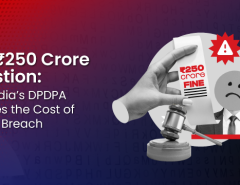The Digital Personal Data Protection (DPDP) Act 2023 marks a pivotal shift in India’s data protection framework, setting clear guidelines for managing personal data. For the Banking, Financial Services, and Insurance (BFSI) sectors, which process vast volumes of sensitive customer information, this legislation is not just another compliance requirement but a strategic imperative.
The DPDP Act 2023 strengthens data security, fosters customer trust, and enhances regulatory alignment, making it a cornerstone for a resilient and customer-centric BFSI ecosystem. This blog delves into the critical reasons why this legislation is essential for the sector.
-
Building Customer Trust and Confidence
In the BFSI sector, trust is the foundation of strong customer relationships. The DPDP Act 2023 enhances this trust by empowering individuals (Data Principals) with greater control over their personal data, including rights to access, rectify, and request erasure under specific conditions. By aligning with the DPDP Act’s principles, BFSI organizations can reinforce their commitment to data privacy and security, strengthening customer confidence.
This proactive approach safeguards compliance and becomes a competitive differentiator in an era where data protection is a key driver of customer loyalty and business growth.
-
Enhanced Regulatory Compliance
The BFSI sector in India operates within a highly regulated ecosystem, overseen by authorities such as the Reserve Bank of India (RBI), the Securities and Exchange Board of India (SEBI), and the Insurance Regulatory and Development Authority of India (IRDAI). The DPDP Act 2023 complements these existing regulations by establishing a unified data protection framework for the sector.
Ensuring compliance with the DPDP Act helps BFSI organizations meet their legal obligations regarding handling digital personal data. It also mitigates the risks of regulatory penalties and legal repercussions, reinforcing operational resilience and trust.
-
Strengthening Data Security
Due to the highly sensitive financial and personal data it handles, the BFSI sector remains a prime target for cyberattacks and data breaches. The DPDP Act 2023 reinforces security by requiring Data Fiduciaries (entities processing personal data) to implement robust safeguards to prevent breaches and mandating timely notifications to the Data Protection Board of India and affected individuals in case of an incident.
By adhering to these stringent security requirements, BFSI institutions can enhance cybersecurity resilience, mitigate risks, and safeguard customer trust and brand reputation in an increasingly threat-prone digital landscape.
-
Promoting Responsible Data Handling
The DPDP Act 2023 enforces key data protection principles, including purpose, data minimization, and storage limitations. For the BFSI sector, this translates to collecting only essential data for defined purposes, retaining it for the necessary duration, and ensuring its accuracy and integrity.
By adopting these responsible data management practices, BFSI organizations can mitigate risks associated with data misuse, strengthen regulatory compliance, and reinforce customer trust. It ensures that personal information is handled with the highest standards of security and diligence.
-
Enabling Innovation with Safeguards
While prioritizing data protection, the DPDP Act 2023 also acknowledges the need for lawful data processing to drive innovation and service excellence. For the BFSI sector, this enables firms to leverage data for customer insights, risk assessment, and hyper-personalization within a consent-driven framework, ensuring transparency and accountability.
The Act provides a clear legal foundation for responsible data utilization, empowering BFSI organizations to enhance customer experience, optimize decision-making, and accelerate business growth while maintaining regulatory compliance.
-
Key Aspects of the DPDP Act Relevant to BFSI
Several key provisions of the DPDP Act 2023 are particularly critical for the BFSI sector:
- Consent Requirements: BFSI firms must obtain explicit and informed consent from customers before processing personal data, with limited exceptions for legitimate purposes.
- Data Security Obligations: Implementing robust technical and organizational safeguards to protect personal data is mandatory.
- Data Breach Notification: Firms must promptly report breaches to the Data Protection Board and affected customers to ensure transparency and accountability.
- Data Retention Policies: BFSI entities must establish clear retention policies, ensuring data is stored only for as long as necessary for its intended purpose.
- Rights of Data Principals: Organizations must enable customers to access, correct, and request erasure of their personal data through well-defined mechanisms.
- Obligations of Significant Data Fiduciaries: Given the high volume and sensitivity of data handled, many BFSI firms will be classified as Significant Data Fiduciaries, requiring additional compliance measures such as appointing a Data Protection Officer (DPO) and conducting Data Protection Impact Assessments (DPIAs).
-
Challenges and Opportunities
Implementing the DPDP Act 2023 presents challenges for the BFSI sector, including adapting existing data processing systems, training employees on compliance requirements, and streamlining consent management. However, these challenges also serve as strategic opportunities to enhance data governance frameworks, fortify cybersecurity measures, and foster greater transparency with customers.
By proactively addressing these aspects, BFSI organizations can ensure compliance, strengthen trust, improve operational resilience, and drive long-term business growth in an evolving regulatory landscape.
Conclusion
The Digital Personal Data Protection (DPDP) Act 2023 is a landmark regulation with far-reaching implications for the BFSI sector in India. The Act fosters a more secure and trustworthy digital financial ecosystem by strengthening data protection, empowering individuals, and enforcing stringent data handling standards. Proactive compliance is not just a legal requirement but a strategic necessity for BFSI institutions to build customer trust, enhance brand reputation, and stay competitive in an evolving digital landscape.
Seqrite offers a comprehensive suite of data protection solutions to help BFSI organizations navigate the complexities of the DPDP Act and ensure robust compliance.




